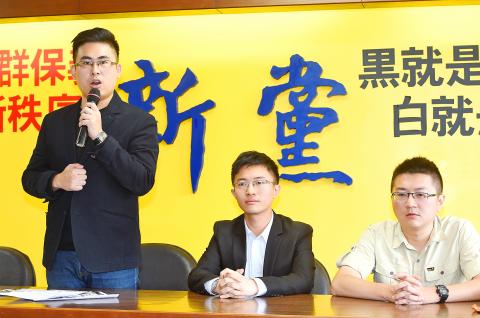New Party spokesman Wang Ping-chung (王炳忠), his father, and New Party youth wing executives Ho Han-ting (侯漢廷) and Lin Ming-cheng (林明正) were indicted yesterday after prosecutors said they found evidence of espionage and Chinese funding.
The three New Party defendants “had endangered national security and social stability by developing an organization for use by the Chinese government and its military” in contravention of the National Security Act (國家安全法), the Taipei District Prosecutors’ Office said.
Wang’s father, Wang Chin-pu (王進步), was charged with being an accessory to espionage and other illegal activities conducted by the other defendants.

Photo: Cheng Hung-ta, Taipei Times
Prosecutors said they uncovered evidence of money transfers from China to the three party members to work with convicted Chinese spy Zhou Hongxu (周泓旭) in his efforts to infiltrate Taiwan’s military and connect with Taiwanese politicians and youth organizations.
Zhou, a former graduate student at National Chengchi University, was Beijing’s liaison and was also responsible for monitoring progress and collecting reports made by Wang Ping-chung, Ho and Lin.
Zhou had set up a “Star Fire Secret Unit” and gave the four of them code names: Wang Ping-chung was “One,” Lin was “Two,” Ho was “Three” and Zhou was “Four,” the prosecution statement said.
Nine retired and active military officials were contacted to obtain classified materials, most of whom reportedly had links to the nation’s weapons procurement programs, prosecutors said.
Documents belonging to Wang Ping-chung showed that he was already working with Chinese officials in 2013, before meeting Zhou, and had later written that officials from China’s Taiwan Affairs Office had promised to provide him and Zhou up to NT$16 million (US$535,296 at the current exchange rate) a year for their work in Taiwan, they said.
Prosecutors said they had uncovered Wang Ping-chung’s accounting ledgers that showed money transfers from Chinese sources, in addition to a work document on which Wang Ping-chung wrote: “[I will] work under the guidance and assistance of the Chinese Communist Party to unite and integration the forces working to achieve unification across the Taiwan Strait.”
Wang Ping-chung allegedly cofounded the pro-unification Web site Fire News (燎原新聞網) with Zhou, which they used to recruit Taiwanese into their spy network.
The Taiwan High Court in April handed Zhou a 14-month prison sentence for attempting to recruit Taiwanese officials.
After the indictments were announced, Wang Ping-chung, Ho and Lin held a news conference in Taipei, at which Wang Ping-chung accused the prosecutors of “concocting a story” without any “smoking gun” evidence.
“If the judiciary has the guts, then I will ask for an open trial so that the public can see and judge for themselves,” he said.
Lin accused the administration of “adopting the ways of Adolf Hitler’s Nazi Party to crack down on dissidents.”

CHAOS: Iranians took to the streets playing celebratory music after reports of Khamenei’s death on Saturday, while mourners also gathered in Tehran yesterday Iranian Supreme Leader Ayatollah Ali Khamenei was killed in a major attack on Iran launched by Israel and the US, throwing the future of the Islamic republic into doubt and raising the risk of regional instability. Iranian state television and the state-run IRNA news agency announced the 86-year-old’s death early yesterday. US President Donald Trump said it gave Iranians their “greatest chance” to “take back” their country. The announcements came after a joint US and Israeli aerial bombardment that targeted Iranian military and governmental sites. Trump said the “heavy and pinpoint bombing” would continue through the week or as long

TRUST: The KMT said it respected the US’ timing and considerations, and hoped it would continue to honor its commitments to helping Taiwan bolster its defenses and deterrence US President Donald Trump is delaying a multibillion-dollar arms sale to Taiwan to ensure his visit to Beijing is successful, a New York Times report said. The weapons sales package has stalled in the US Department of State, the report said, citing US officials it did not identify. The White House has told agencies not to push forward ahead of Trump’s meeting with Chinese President Xi Jinping (習近平), it said. The two last month held a phone call to discuss trade and geopolitical flashpoints ahead of the summit. Xi raised the Taiwan issue and urged the US to handle arms sales to

BIG SPENDERS: Foreign investors bought the most Taiwan equities since 2005, signaling confidence that an AI boom would continue to benefit chipmakers Taiwan Semiconductor Manufacturing Co’s (TSMC, 台積電) market capitalization swelled to US$2 trillion for the first time following a 4.25 percent rally in its American depositary receipts (ADR) overnight, putting the world’s biggest contract chipmaker sixth on the list of the world’s biggest companies by market capitalization, just behind Amazon.com Inc. The site CompaniesMarketcap.com ranked TSMC ahead of Saudi Aramco and Meta Platforms Inc. The Taiwanese company’s ADRs on Tuesday surged to US$385.75 on the New York Stock Exchange, as strong demand for artificial intelligence (AI) applications led to chip supply constraints and boost revenue growth to record-breaking levels. Each TSMC ADR represents

State-run CPC Corp, Taiwan (CPC, 台灣中油) yesterday said that it had confirmed on Saturday night with its liquefied natural gas (LNG) and crude oil suppliers that shipments are proceeding as scheduled and that domestic supplies remain unaffected. The CPC yesterday announced the gasoline and diesel prices will rise by NT$0.2 and NT$0.4 per liter, respectively, starting Monday, citing Middle East tensions and blizzards in the eastern United States. CPC also iterated it has been reducing the proportion of crude oil imports from the Middle East and diversifying its supply sources in the past few years in response to geopolitical risks, expanding